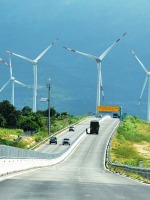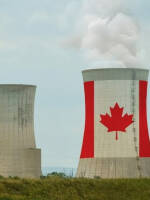
The draft amended Law on Economical and Efficient Use of Energy will be submitted to the National Assembly for review in June 2025, the Ministry of Industry and Trade has said.
The draft will be presented at the 9th session of the 15th National Assembly in June next year, focusing on the amendments to some provisions that have become outdated since the law first came into effect in 2011.
The Law on Economical and Efficient Use of Energy was passed by the National Assembly in June 2010 and took effect on January 1, 2011.
After 14 years of implementation, it has provided a legal framework, removed barriers and detailed measures on management, technical regulations and policies to promote the use of energy-efficient practices across all sectors, enabling the country to implement sustainable energy efficiency nationwide.
However, as the economy develops, the law has revealed certain limitations, especially in actualising Việt Nam’s goal of net-zero emissions by 2050.
According to the Energy Efficiency and Sustainable Development Department at the Ministry of Industry and Trade, the law’s enforcement mechanisms and penalties for violations are not strong enough.
There are also gaps in preferential policies for promoting energy efficiency, and there are signs of unhealthy competition in energy audits, with low audit quality.
To address these shortcomings, the ministry proposed amendments to five key areas of the law: energy management policies, workforce development, energy efficiency market development, energy performance management and State management of energy efficiency.
In terms of energy management policies, the ministry proposed to add regulations on energy management for conglomerates and State-owned enterprises, especially in controlling fuel loss rates, as well as to enhance the responsibility of local authorities in making sure businesses in their areas comply with energy consumption standards and norms.
To develop the workforce and an energy services consulting network, the ministry proposed to amend the law regarding training and capacity-building for individuals and organisations involved in energy efficiency consulting, energy auditors and energy managers at energy-consuming facilities. Mechanisms to support and establish a network of energy service companies should also be developed.
To build a market for energy efficiency, tools like funds to promote energy-efficient solutions should be established, with clarification of tax and financial support for energy efficiency investments, including projects to upgrade production lines or expand production scales using energy-saving technologies.
To manage the energy performance of equipment and vehicles in the market, the ministry proposed an expansion of the range of energy-consuming equipment and vehicles to be included in the energy labelling programme, along with adding building materials, such as glass and non-fired bricks, to the labelling list.
In terms of improving State management of energy efficiency, specific regulations should be added on the responsibility of ministries and provincial People’s Committees in purchasing energy-efficient equipment for State-funded projects. The roles and responsibilities of the national focal point agency, related ministries and local governments in this field should be clearly defined.
(VNS)




